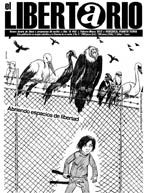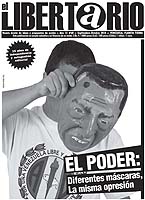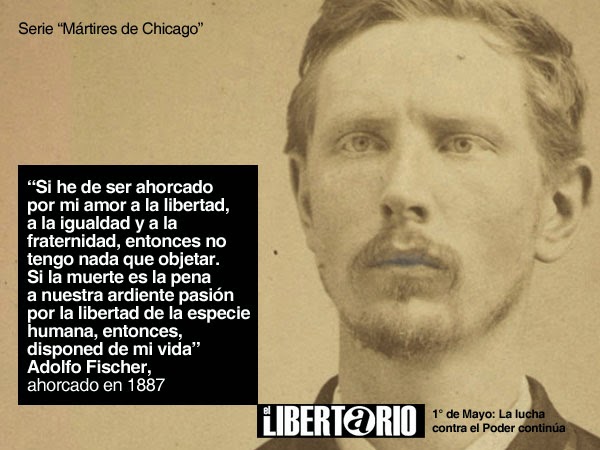[Nota previa del autor: el texto a continuación se escribió con el propósito de presentar una opinión personal desde una perspectiva libertaria y antiautoritaria sobre la situación en Venezuela. Esto, a petición de un articulista de la página web Krapuul.nl. Se encuentra escrito al inglés a modo de facilitar su traducción a cualquier otro idioma, dado a que originalmente el artículo sería traducido y publicado en neerlandés. Con esta consideración, tomo el momento para disculparme por cualquier error gramático o semántico que pueda contener.]
Javier Bastardo
Cumaná, Sucre, September 13th 2016
It is undeniable what, for some, the cultural phenomenon of the
“Socialism of the XXI Century” meant when it arrived by the incisive hindsight
and sharp tongue of the charismatic late president, Hugo Chávez Frias.
The victory of Chávez meant for the leftist political parties an
opportunity that they couldn't have even dreamed before, as after 40 years of
democracy on the country, and a failed venture in guerrilla warfare, not one
candidate of the traditional left ever came close to winning a presidential
election.
Hugo Chávez’s presidential campaign was vastly supported by most of the
left-leaning political organizations and movements of the time, with a few
exceptions. After winning, a number of changes were discussed and formed into a
new constitution for the country, one presented as social equity and justice.
The year was 1998 to 1999 and shortly after that, and the turmoil generated by
a successful but reverted coup in 2002 that ended with the government taking control
on the national petroleum enterprise, the country entered in the most
prosperous economic period it has ever seen.
But let’s fast-forward to some of the problems the people on Venezuela
are facing today on a daily basis:
·
Instituted
public healthcare facilities are suffering from low resources of medical equipment
and supplies as people die because of the rampant lack of medicines.
·
A lack of proper
planning and maintenance of the power plants has brought national blackouts,
even coming to the point of instating state-regulated “planned” power blackouts
and buying old thermoelectric plants to maintain a steady, if not really that
faithful, electrical service.
·
Food shortages
have been responded by state-regulated selling points of what can be described
as “bags of food” (called CLAP), which contain a random number and variation of
first-necessity food products (cheese, flour, coffee, meat, etc.) and hygiene
products (dishwasher soap, toothpaste, deodorant, etc.). This “bags” which are
given to Communal representatives of a populated area are then sold in a spot
normally under the custody of military government forces. Although each product
has it regulated price marked down, that price of the bag, and its content, may
vary from one selling-spot to the other, and people have complained of the
varying changes in prices as well as the regularity and quantity of the bags,
which they say is not enough.
·
Given that the
CLAP is not enough, and not all the people are getting it, those who can spare
the time tend to queue in long lines for hours under the Sun in order to obtain
certain items who markets and stores get to sell from time to time in regulated
prices. 8 hours for a can of powder milk, one bottle of tomato sauce and one
pack of rice. Over 10 hours for a couple of medium sized chickens, and so on.
How much they will stay on the line is only regulated by their health,
resilience and quantity of the product. For a time, people tended to queue in
lines as early as 2AM in the morning, hoping to obtain a good spot and buy
whatever the market was potentially selling that day. The government declared
this early lines illegal and punishable by prison. Some people still risk it.
·
Shortages of
products has brought forward a unique kind of commercial trade. Called “Bachaqueros”,
these are people who often queue in long lines all day long, buying any
quantity of regulated products they can in order to later re-sell them for even
five-times the actual price of product itself, or more. Milk, soap, tires,
meat, chicken, toothpaste, eggs, and any other product that is rarely seen on
the markets gets sold on the streets by everyday people. The government has
tried to bring this trade down, without any luck.
·
Insecurity has
been gradually increasing in an exponential rate over the years. Kidnappings,
assassinations, charging from protection, among other thing, are being taken to
action by a vast network of individuals organized and controlled from inside
prisons as well as members of the State security forces, leading to public
confrontations between State and Municipal police forces, for example.
What happened? Are the United States and the efforts of the
international right-wing, working together with the opposition movement in the
country, the ones to blame for everything that has happened since the death of
former president Hugo Chávez in 2013 and the rise of his successor, Nicolas
Maduro? Many would like to believe that, and some do, as it is what the
government keeps telling the country on some sort of disastrous double speech.
One hand they deny, or alright mock, the suffering the people since they
consider some of the pleas to come from protests and preparations cooked up by
the opposition and the CIA in an effort to get the international community to
support them. On the other hand, they do recognize, hardly, some of the daily
problems that we Venezuelans go through, but they choose to blame it to the
private sector, natural phenomena, international intervention, the opposition,
among other, but hardly doing any effort of autocriticism.
It’s been 17 years since Chávez and his administration came to power.
Despite having state controlled factories, farms, industries, market chains,
banks, universities and being the only providers of almost all of the principal
services in the country (electrical, water, gas), with an all-time high
popularity among voters and the highest prices on oil, the government of
Venezuela failed take advantage of the income, and positively turning it into
an economic base for the future growth of the country. Many of the mistakes of
the past are rampant today, even in a greater extend. Corruption has spread and
infected almost all levels of public and private administration with no control
or regulation, as well as the judicial system. We are still a mostly
mono-productive country where our main income comes from the fluctuating prices
of petroleum while a push for agricultural advance was put on a second or third
position.
The state uses the ideals of the “left” to present itself as “change”
and “progress”, working and fighting for a revolution that never existed in the
first place, something that can be seen by the recent events on Brazil and
Argentina. The State’s power in South America has remained the same, regardless
of it being left populist or right-wing regimes. Military regimes,
social-democracy, neoliberalism, left-leaning charismatic individuals and now
the center to right-wing political forces are all variants of the same power of
the region. They’re all the same thing, the only difference is the language
they use to justify their actions.
Those who would rather have this failed “left” administration and those
who resent it but still believe in the “Bolivarian” project, fall into the
error of not recognizing that what Nicolas Maduro is doing is simply a
continuation of the project that Hugo Chávez was bringing in the longer term.
The perfect example of that is the ecocide of the AMO (Arco Minero del
Oricono), a mega open air mining project in collaboration with over 150
transnational corporations proposed by the government which looks to exploit
mineral resources along a great area of the Orinoco river in order to
compensate for the lowering oil prices. A project this big will not only
endanger the fresh water resources of the Orinoco and Caroni rivers but will
also be a threat to the indigenous population, and they are doing all of this
in the name of “ecosocialism”. It should not be a surprise, this is the same
government that hasn't stopped at all the exploitation of coal in the Sierra de
Perijá, but what they are doing with the AMO is both baffling and ridiculously
dangerous.
The popularity of the government has fallen to an all-time low these
days, and that can be felt on the air and everyday actions. People are
understanding the actual role and capacity the state had to solve some of the
issues with better planning. Day after day, more and more communities join into
public acts of rejection against the government, through protests that led up to
mass arrests and an excess of force by the state forces of control.
Militarization of towns, cities and many urban areas for long periods of time
have been instituted. There have been many arrests of reporters, as well as
their smartphones and equipment being taken from them against their rights,
when they are present on some of this protests.
Those of us who believe in the principles of freedom, we work and push
for the collective to finally realize that our future is in our hands and not
on some dogmatic ideology or some charismatic “messiah”. We thrive for the
abolition of the places and figures of power instead of reaching or managing
it, and this will happen through a redefinition of objectives for the future of
Venezuela from its people. The government, and its opposition grouped in the
MUD (Mesa de la Unidad Democrática), are nothing more than the two heads of the
same monster. There are many factors looking for power, and that is the thing,
they are looking for it, they want it, they want to govern, they want to rule,
and will do it against the will and individual liberties of many.



















































No hay comentarios:
Publicar un comentario
Nos interesa el debate, la confrontación de ideas y el disenso. Pero si tu comentario es sólo para descalificaciones sin argumentos, o mentiras falaces, no será publicado. Hay muchos sitios del gobierno venezolano donde gustosa y rápidamente publican ese tipo de comunicaciones.